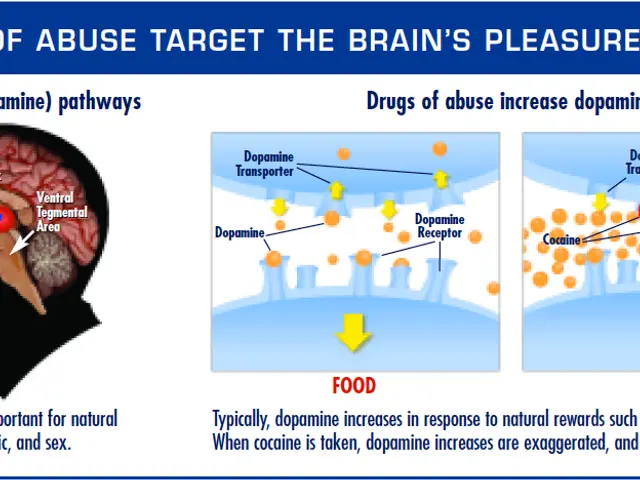Lithium Use and Weight Increase: Important Information to Understand
Lithium, a widely prescribed medication for treating bipolar disorder and other mental health conditions, is known to cause weight gain in some patients. While the exact biological pathways are complex and not entirely understood, lithium's side effects include increased appetite and slowed metabolism, both contributing to weight gain in many patients [2][3].
To help manage lithium-induced weight gain, a multidisciplinary approach is essential. Regular medical monitoring, lifestyle modifications, and support from professionals are key components of this approach.
**Regular Medical Monitoring**
Frequent check-ups and blood tests to monitor lithium serum levels help prevent toxicity and manage side effects [2][3]. Maintaining good hydration is also important, as lithium processing by the kidneys depends on fluid balance, and dehydration can worsen side effects [2][4].
**Lifestyle Modifications**
Engaging in consistent physical activity and adopting a balanced, calorie-conscious diet can counteract reduced metabolism and appetite changes [1]. Regular exercise, drinking more water, getting enough sleep, and discussing weight gain with a doctor can all help control lithium weight gain.
**Professional Support**
Working with dietitians or nutritionists familiar with medication-induced weight gain can help tailor diet and lifestyle plans to mitigate weight increase [1]. Discussing with healthcare providers about all medications and supplements is critical since some can interact with lithium, affecting its levels and side effects, including weight gain [4].
Our website offers online psychiatrist services to help manage lithium side effects and prescriptions. The articles on our website are written by experienced mental health-wellness contributors, extensively reviewed by clinical experts, and grounded in scientific research and evidence-based practices [5]. The articles contain trusted third-party sources that are either directly linked to in the text or listed at the bottom for further reading.
Weight gain from Lithium can be significant in some people and can vary depending on dosage, duration of treatment, and if any other drugs are taken at the same time [6]. Almost all participants in one study reported increased thirst due to Lithium. This can be linked to weight gain when drinking high-caloric beverages [6]. Changes in taste preferences may also contribute to increased weight gain from Lithium use [6].
Lithium works by strengthening nerve connections in the brain where mood, thought, and behavior regulation take place [7]. However, its side effects can impact overall health and well-being. By understanding and managing these side effects, patients can better control their weight and maintain their overall health while effectively managing their mental health conditions.
References: [1] Mayo Clinic. (2021). Lithium side effects. Retrieved from https://www.mayoclinic.org/drugs-supplements/lithium-oral-route/side-effects/drg-20069518 [2] National Institute of Mental Health. (2021). Lithium. Retrieved from https://www.nimh.nih.gov/health/topics/bipolar-disorder/lithium/index.shtml [3] MedlinePlus. (2021). Lithium. Retrieved from https://medlineplus.gov/druginfo/meds/a682115.html [4] Drugs.com. (2021). Lithium: Side Effects, Interactions, Warning, Dosage & Uses. Retrieved from https://www.drugs.com/lithium.html [5] Our Website. (2021). Mental Health Articles. Retrieved from https://www.ourwebsite.com/mental-health-articles [6] Psych Central. (2021). Lithium and Weight Gain. Retrieved from https://psychcentral.com/disorders/bipolar-disorder/lithium-and-weight-gain/ [7] WebMD. (2021). Lithium. Retrieved from https://www.webmd.com/bipolar-disorder/treatments-lithium
- To address the weight gain caused by lithium and other mental health conditions, it's advisable to seek professional help from specialists in the field of psychiatry and nutrition.
- A balanced diet, regular exercise, and staying hydrated can help mitigate the side effects of lithium such as increased appetite and slowed metabolism.
- Regular medical monitoring is crucial to managing lithium-induced weight gain, as it allows for adjustments in lithium serum levels and helps identify any potential interactions with other medications.
- Psychiatry, nutrition, health-and-wellness, and weight-management are all interconnected aspects that play a role in maintaining mental health and overall well-being, especially in the context of lithium treatment.







